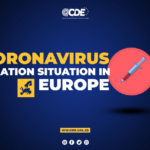Following the detection of the new Omicron variant and the increase of diagnosed cases in Europe, European countries have taken steps to prevent the spread of the virus among their populations.
Council of Ministers approves the end of the mandatory use of face masks in Spain
The Council of Ministers has approved this Tuesday the Royal Decree by which, from tomorrow, April 20, the use of face masks will no longer be mandatory in general. The measure will come into force after its publication tomorrow in the Official State Gazette (BOE).
As explained in a press conference by the Minister of Health, Carolina Darias, the very high vaccination coverage against COVID-19 and the current epidemiological situation of our country, have made possible the relaxation of the current rule on the use of masks; one of the most symbolic elements in the fight against the SARS-CoV-2 coronavirus pandemic.
However, the use of masks will continue to be mandatory in certain contexts and its use is advised in different situations, especially related to people and environments of special vulnerability.
Thus, detailed Darias, it will continue to be mandatory in health centers, services and establishments, such as hospitals, health centers, transfusion centers or pharmacies, both for people working in them, as well as for visitors. The exception is that it will not be mandatory for people who are admitted when they stay in their rooms.
Likewise, the use of face masks will continue to be mandatory in healthcare centers, such as nursing homes, both for people working in them and for visitors. This is not the case for residents.
The use of face masks is also mandatory in air, rail and cable transport and in buses, as well as in public passenger transport. Also in the case of enclosed spaces of ships and boats in which it is not possible to maintain the distance of 1.5 meters, except in cabins, when they are shared.
Source: Ministry of Health
End of mandatory use of face masks in the open air
After a month and a half of obligatory outdoor masks, this week citizens will be able to go without them on the street again. At its extraordinary meeting this Monday, the Interterritorial Council of the National Health System (CISNS) has supported this measure, which was announced on Friday by the Minister of Health, Carolina Darias. Once the royal decree to be approved by the Council of Ministers comes into force on Thursday 10, the outdoor mouthguards will simply be “recommended” when there are crowds, as the ministry reported in a communiqué.
Given the clear decline of the sixth wave of covid in Spain, the council has also approved raising the capacity limits for sports competitions, which will go from 75% to 85% in open enclosures and from 50% to 75% in closed ones, “respecting the non-pharmacological measures of protection against covid-19″. That is, in these cases it will be necessary to wear a mask.
Masks will also no longer be mandatory during breaks as of Thursday.
After a year and a half with the mask on at recess, children will be able to take it off from Thursday. The royal decree approved this Tuesday in the Council of Ministers eliminates the compulsory use of mouth masks outdoors, and this also affects educational centers.
“In school playgrounds children will be able to play without masks” from Thursday, said the government spokeswoman, Isabel Rodriguez. The rule will be published this Wednesday in the Official State Gazette and will come into force a day later.
More information: El País
Sweden lifts all pandemic restrictions as of today
As of Wednesday, Sweden lifts all current restrictions due to the coronavirus pandemic because of the high percentage of the population vaccinated and the lower risk of the omicron variant.
Sweden thus joins Denmark, the first country in the European Union (EU) to lift all restrictions on 1 January, and no longer considers covid-19 a “critical” disease for society, although infection remains high in the country, with record numbers.
More information: Deutsche Welle
New rules on the EU digital COVID certificate enter into force
On 21 December 2021, the European Commission adopted rules relating to the EU digital COVID certificate establishing a validity of 9 months or 270 days once 14 days have passed after the completion of the primary vaccination cycle.
In addition, the rules for the encoding of vaccination certificates will be adapted to take into account booster shots. Boosters will be recorded as follows:
- 3/3 for a booster dose following a primary 2-dose vaccination series
- 2/1 for a booster dose following a single-dose vaccination or a one dose of a 2-dose vaccine administered to a recovered person
The new rules will apply as of today, 1 February 2022.
Austria eases some COVID-19 restrictions
From 5 February, shops and restaurants will be allowed to stay open until midnight in Austria and the maximum number of people allowed to participate in events will be increased to 50. Also as of yesterday, 1 February, some movement restrictions for the unvaccinated were lifted, although they still cannot enter restaurants or buy non-essential items, as part of government efforts to boost what was once the lowest vaccination rate in Western Europe.
Daily new coronavirus infections have been rising in Austria, but pressure on hospitals has eased and the wave is expected to peak around 7 February.
Read more: The Guardian
Austria removes some restrictions against COVID-19
Austria’s chancellor, Karl Nehammer, said that from next Saturday, shops and restaurants would be able to stay open until midnight and the maximum number of people able to participate in events would rise from 25 to 50.
Restrictions on movement for the unvaccinated were lifted on Monday, although they remain barred from eating in restaurants or shopping for non-essential items as part of government efforts to boost what was western Europe’s lowest vaccination rate.
Más información: The Guardian
United Kingdom, Netherlands, Denmark and Italy remove most of the restrictions imposed by COVID-19
The British government announced on January 27 that the mandatory use of face masks and the submission of the COVID-19 passport for access to nightlife venues would be eliminated. Restrictions on access to nursing homes will also be lifted next week.
Likewise, in the Netherlands, restaurants, bars, museums and theaters reopened on January 27 for the first time in a month. This measure came at a time when infections in the country have soared, although admissions to intensive care units have declined.
In Denmark, Prime Minister Mette Frederiksen said on Wednesday that from Feb. 1, Danes will be allowed to enter restaurants, museums and nightspots without restriction, and that the requirement to wear masks on public transport and in stores will also be lifted.
More information: ABCNews
The Italian Minister of Health, Roberto Speranza, announced on Wednesday, January 26, that, as of February 1, Italy will relax the COVID-19 restrictions imposed on all travelers from European Union countries, with only the presentation of the green passport being required from then on.
The green passport is a document certifying that a person has been vaccinated, recovered or tested negative in recent tests. According to the regulations that will apply as of February 1, all EU citizens presenting one of the above-mentioned certificates will soon be able to enter Italy without having to follow additional entry rules.
More information: Schengenvisainfo
Council adopts a revised recommendation on COVID-19 travel measures, based on the individual situation of persons and no longer on the region of origin
The Council today adopted a recommendation on a coordinated approach to facilitate safe free movement during the COVID-19 pandemic. This recommendation responds to the significant increase in vaccine uptake and the rapid roll-out of the EU digital COVID certificate, and replaces the previously existing recommendation. It will enter into force on 1 February 2022, on the same day as a delegated act amending the digital COVID-19 certificate regulation and providing for an acceptance period of 270 days for vaccination certificates.
Under the new recommendation, COVID-19 measures should be applied taking into account the status of the person instead of the situation at regional level, with the exception of areas where the virus is circulating at very high levels. This means that a traveller’s COVID-19 vaccination, test or recovery status, as evidenced by a valid EU digital COVID certificate, should be the key determinant. A person-based approach will substantially simplify the applicable rules and will provide additional clarity and predictability to travellers.
Person-based approach
Travellers in possession of a valid EU digital COVID certificate should not be subject to additional restrictions to free movement.
A valid EU digital COVID certificate includes:
- A vaccination certificate for a vaccine approved at European level if at least 14 days and no more than 270 days have passed since the last dose of the primary vaccination series or if the person has received a booster dose. Member states could also accept vaccination certificates for vaccines approved by national authorities or the WHO.
- A negative PCR test result obtained no more than 72 hours before travel or a negative rapid antigen test obtained no more than 24 hours before travel.
- A certificate of recovery indicating that no more than 180 days have passed since the date of the first positive test result.
Persons who are not in possession of an EU digital COVID certificate could be required to undergo a test prior to or no later than 24 hours after arrival. Travellers with an essential function or need, cross-border commuters and children under 12 should be exempt from this requirement.
Map of EU regions
The European Centre for Disease Prevention and Control (ECDC) should continue to publish a map of member states’ regions indicating the potential risk of infection according to a traffic light system (green, orange, red, dark red). The map should be based on the 14-day case notification rate, vaccine uptake and testing rate.
Based on this map, member states should apply measures regarding travel to and from dark red areas, where the virus is circulating at very high levels. They should in particular discourage all non-essential travel and require persons arriving from those areas who are not in possession of a vaccination or recovery certificate to undergo a test prior to departure and to quarantine after arrival.
Certain exceptions to these measures should apply to travellers with an essential function or need, cross-border commuters and children under the age of 12.
Emergency brake
Under the new recommendation, the emergency brake to respond to the emergence of new variants of concern or interest is strengthened. When a member state imposes restrictions in response to the emergence of a new variant, the Council, in close cooperation with the Commission and supported by the ECDC, should review the situation. The Commission, based on the regular assessment of new evidence on variants, may also suggest a discussion within the Council.
During the discussion, the Commission could propose that the Council agree on a coordinated approach regarding travel from the areas concerned. Any situation resulting in the adoption of measures should be reviewed regularly.
More information: EU Commission
This agreement follows the Commission’s proposal of 25 November 2021. Welcoming the adoption by the Council, Commissioner for Health, Stella Kyriakides, and Commissioner for Justice, Didier Reynders, said:
Since the start of the pandemic, we have put forward solutions to safeguard and facilitate safe and free movement in the context of health measures made necessary by the pandemic. Close coordination at EU level has been essential, not only for the functioning of the Single Market, but in particular to provide clarity and safety for people traveling within the EU. Clarity and predictability for our citizens is key to the success of safe travel, through our well-established and very successful EU Digital COVID Certificate. More than 1.2 billion certificates issued testify to the success of this tool, which has been rolled out across the EU and on a global scale. It is a true European success story that has gone global.
Today, Member States have reconfirmed that the possession of a valid EU Digital COVID Certificate should in principle be sufficient when travelling during the pandemic. This agreement thus puts the EU Digital COVID Certificate at the heart and centre of our coordinated approach. It is important that Member States follow up on this agreement and implement the rules agreed without delay. Each Member State decides based on the circumstances it is facing. But Omicron has by now spread across Europe and it is time to look at the discontinuation of the additional travel measures that a number of Member States have introduced in the past weeks, making travel more cumbersome and less predictable across the EU.
We now call on all Member States to implement the common rules swiftly to ensure coordination and clarity for our citizens and travellers.”
More information: EU Commission
France to lift most restrictions against covid-19 in February
France will lift most of the restrictions in place as of 2 February. Thus, the required capacity in open spaces will be modified and the mandatory use of masks in open spaces will be eliminated. The latter had generated a great deal of controversy when it was reimposed with the arrival of the omicron variant, even for those who had already been vaccinated with a double dose.
It is also being considered to eliminate compulsory teleworking for those professions that are able to do so, as is currently the case. This could mean a gradual return to offices, although the Government will continue to consider this model “advisable” to avoid contagion during working hours.
It is expected that, from 16 February, the current regulations will also be modified with regard to leisure premises.
More information: France24
Council removes Argentina, Australia and Canada from the list of countries for which travel restrictions should be lifted
Today, 17 January, the Council updated the list of countries, special administrative regions and other entities and territorial authorities for which travel restrictions should be lifted. In particular Argentina, Australia and Canada were removed from the list.
Based on the criteria and conditions set out in the recommendation, as from 17 January 2022 member states should gradually lift the travel restrictions at the external borders for residents of the following third countries:
- Bahrain
- Chile
- Colombia
- Indonesia
- Kuwait
- New Zealand
- Peru
- Qatar
- Rwanda
- Saudi Arabia
- South Korea
- United Arab Emirates
- Uruguay
- China, subject to confirmation of reciprocity
Travel restrictions should also be gradually lifted for the special administrative regions of China Hong Kong and Macao.
Under the category of entities and territorial authorities that are not recognised as states by at least one member state, travel restrictions for Taiwan should also be gradually lifted.
Residents of Andorra, Monaco, San Marino and the Vatican should be considered as EU residents for the purpose of this recommendation.
More information: European Council
Norway facilitates national COVID-19 measures and Finland extends current COVID-19 travel restrictions until January 31
The Norwegian authorities have announced that the country will ease some of its national restrictions starting from tomorrow, January 15. Under the new rules, kindergarten and primary schools will no longer limit the number of children within the same space. Moreover, children and youngsters can now carry out outdoor activities without being subject to any limitations. Adults can also exercise outdoors as usual as well as be in contact with others if necessary. Additionally, adults will be able to stay out in restaurants and other drinking places until 11 pm.
Regarding the entry of foreign nationals and returning travellers, the authorities have announced that everyone will still continue to be subject to entry rules.
More information: Schengenvisainfo
Internal border control and entry requirements will continue to apply to travellers reaching Finland, the Finnish Ministry of Interior has announced. The decision was determined during a plenary session on January 13 and will enter force on Monday, January 17.
Although the entry rules will remain unchanged for the most part, meaning travellers have to present a vaccination certificate in order to enter the country, those unable to get vaccinated due to medical reasons must present the medical proof to confirm their symptoms and a COVID-19 test taken 48 hours before arrival. The requirement applies to all travellers aged 16 and above. The decision on external border traffic will be adjusted for third-country nationals, as they will be able to enter the country under similar grounds as EU and Schengen nationals can.
More information: Schengenvisainfo







Leave a Reply